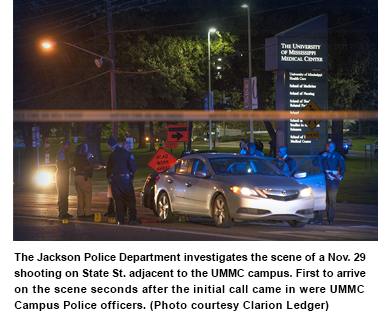Addressing Gun Violence in Our Community
Good morning!
Today I want to follow up with a couple of thoughts related to last week’s shooting on North State Street.
First, I want to again commend our Campus Police, led by Chief Michael Stamps, and our Emergency Services team, led by Chief Administrative Officer Dr. Jonathan Wilson, for their quick, effective and professional response to the situation. Kudos also to our ED teams who took care of the patients. We have been fortunate not to have had an “active shooter” situation on campus, so this experience offered a way to test our plans and our training in a situation that, we all agree, could have been a lot worse.
 This event occurred only a month following my participation in a panel discussion at the annual meeting of the Association of American Medical Colleges. The topic was, “A Conversation About Gun Violence in Our Own Communities.”
This event occurred only a month following my participation in a panel discussion at the annual meeting of the Association of American Medical Colleges. The topic was, “A Conversation About Gun Violence in Our Own Communities.”
In addition to myself, the panelists included leaders from two academic medical centers in Chicago – Northwestern University and the University of Chicago. The session was moderated by Dr. Atul Grover, the AAMC’s executive vice president.
In a nutshell, our discussion focused on the ways in which gun violence in our communities impacts academic medical centers and what role, if any, our organizations have in addressing the epidemic of gun violence. (If you are on Twitter, you may have seen #ThisIsOurLane.)
Just a little context: Unfortunately, Jackson, Mississippi and Chicago, Illinois share the dubious distinction of having higher-than-average rates of gun violence in their respective jurisdictions. Chicago is often in the news for the high number of homicides that occur there, but the actual murder rate in Jackson is typically higher than Chicago’s. In fact, Jackson recently recorded its 79th homicide for 2018. By comparison, when I finished my residency in 1995, 31 people were killed in the capital city, according to news reports.
As most of you know, the results of these violent interactions among our citizens often wind up in the UMMC Emergency Department. During the last five years, our records indicate our Adult ED has had nearly 6,000 encounters with gunshot wound victims. That’s about three per day. A little more than half of these were “unique” patients, meaning nearly 3,000 of those treated had been seen more than once for a gunshot wound during a five-year period.
I won’t delve into all the statistics, but most of these patients are young men who reflect the racial makeup of the city. And half of all gunshot wound patients had been using alcohol, drugs or some combination of the two.
With these impacts in mind, academic medical centers are increasingly working with others in their communities to curb violence of all kinds, and particularly gun violence. Violent behavior can be viewed as a public health problem that can be addressed through coordinated action with government, law enforcement, schools and the business and health care communities.
Of course, taking on this problem requires resources, and our institutions in Mississippi are challenged more than most in that regard. But we have taken a few small steps in this direction, including reaching out to the community through our school nurse programs at two Jackson elementary schools, our adolescent health clinic at a local high school, our student-run Jackson Free Clinic and our mid-town clinic operated by our School of Nursing. We also operate a number of community-focused programs at the Jackson Medical Mall Thad Cochran Center.
These activities may not be specific to violence prevention, but they lay the groundwork to assess the social determinants of health status, including personal safety. And our John D. Bower School of Population Health, which will be a driver of change in this area in the future, has already begun screening adult hospital patients for similar determinants in their home environments.
Some may question whether academic medical centers have a role in trying to rein in gun violence. As an emergency physician who saw my fair share of gunshot wounds, I would say emphatically, “Yes!” I don’t want us to just be a passive recipient of the bloody carnage that occurs in our community. I feel an ethical obligation to be part of the solution.
Gun violence is a multifaceted, complex problem that requires a similarly complex and collaborative response. We are not going to change this overnight. But it all starts with a shared sense of responsibility and an understanding that nobody is going to fix this problem for us, on our journey toward A Healthier Mississippi.



